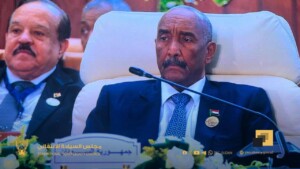Red Sea ports closed – resistance to eastern Sudan track in peace accord grows
The cycle of protests against the eastern Sudan track of the peace agreement signed by the Sudanese government and the Sudan Revolutionary Front rebel alliance on October 3, expanded in Red Sea state on Monday.
 Protestors fix a banner to the gates of the closed port (Social media)
Protestors fix a banner to the gates of the closed port (Social media)
The cycle of protests against the eastern Sudan track of the peace agreement signed by the Sudanese government and the Sudan Revolutionary Front rebel alliance on October 3, expanded in Red Sea state on Monday.
The Bashayer Port for oil export joined the southern Port Sudan harbour, and the ports of Suakin, Heidob, and Demadema on the list of closed ports.
Abdallah Obshar, the rapporteur of the Beja Nazirs Council, told Radio Dabanga that the Khartoum-Port Sudan highway was blocked for the third consecutive day in a number of points, including Hosheiri, Sinkat, Suakin, and Haya.
The sit-in in the southern port is continuing he said. All ports have stopped providing services since Sunday.
In a statement on Saturday, the High Council of Beja Nazirs* and Independent Chieftains stated that the eastern Sudan track accord has ignited violence and discord, and caused the recent rifts in the social fabric in eastern Sudan.
The eastern Sudan track was finalised in February during the peace negotiations between Khartoum and the Sudan Revolutionary Front rebel alliance in Juba.
The signing of the comprehensive peace agreement in Juba last week, which includes the eastern Sudan protocol, “will only increase the crisis and will not bring peace”, according to the Council.
Obshar said that the federal government has not communicated with the Beja Council since the beginning of the recent protests. “The cessation of the protests is subject to response to the decisions made in the Sinkat Conference, including the abolition of the eastern Sudan protocol in the peace agreement.”
He warned for the escalation of the protests if their demands were not met.
Lt Gen El Sadig Ibrahim, a delegate of the Federal Police who arrived in Port Sudan on Monday to assess the developments of the events, met with the governor of Red Sea state Abdallah Shankarai, and discussed the situation, in particular the closure of the Khartoum-Port Sudan highway, and possible solutions.
On Monday evening, the Beja Nazirs Council agreed to open the highway, based on government promises to address the situation within 48 hours, while continuing to close the ports.
A police officer Badawi Yousef was fatally stabbed with a knife in the area of Haya on Monday.
Obshar explained that the officer was killed in friction with protesters against the eastern Sudan peace protocol.
The police said in a statement that a group of protestors attempted to storm a petrol station in Haya locality in Red Sea state on Monday morning. When the police tried to stop the, police guard First Lt Badawi Yousef was stabbed with a sharp object. Three suspects have been arrested.
The Forces of the Declaration of Freedom and Change in Red Sea state said in a statement yesterday evening that what is happening in eastern Sudan in general and Red Sea state in particular is the result of the accumulation of grievances in the region, “which requires our government to rethink its policies concerning the region’s issues”.
The statement called for the acceleration of the convening of a consultative forum for the eastern Sudanese, where the political and civilian forces in the region are able to discuss practical and scientific proposals for solution of the contentious issues and peaceful coexistence in the region.
* A nazir is a state-appointed administrative chief of a tribe, according to the Native Administration system in Sudan.
Radio Dabanga’s editorial independence means that we can continue to provide factual updates about political developments to Sudanese and international actors, educate people about how to avoid outbreaks of infectious diseases, and provide a window to the world for those in all corners of Sudan. Support Radio Dabanga for as little as €2.50, the equivalent of a cup of coffee.












 and then
and then